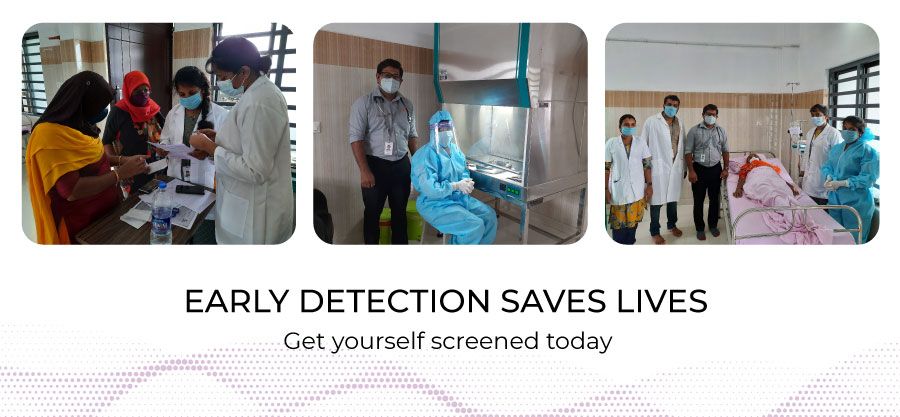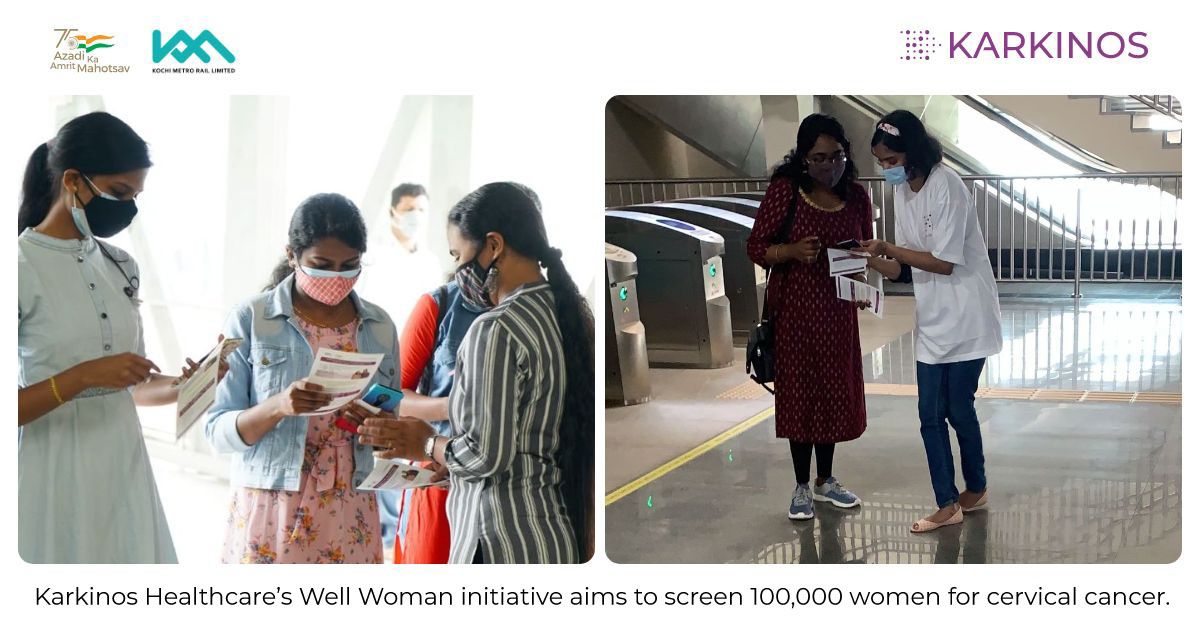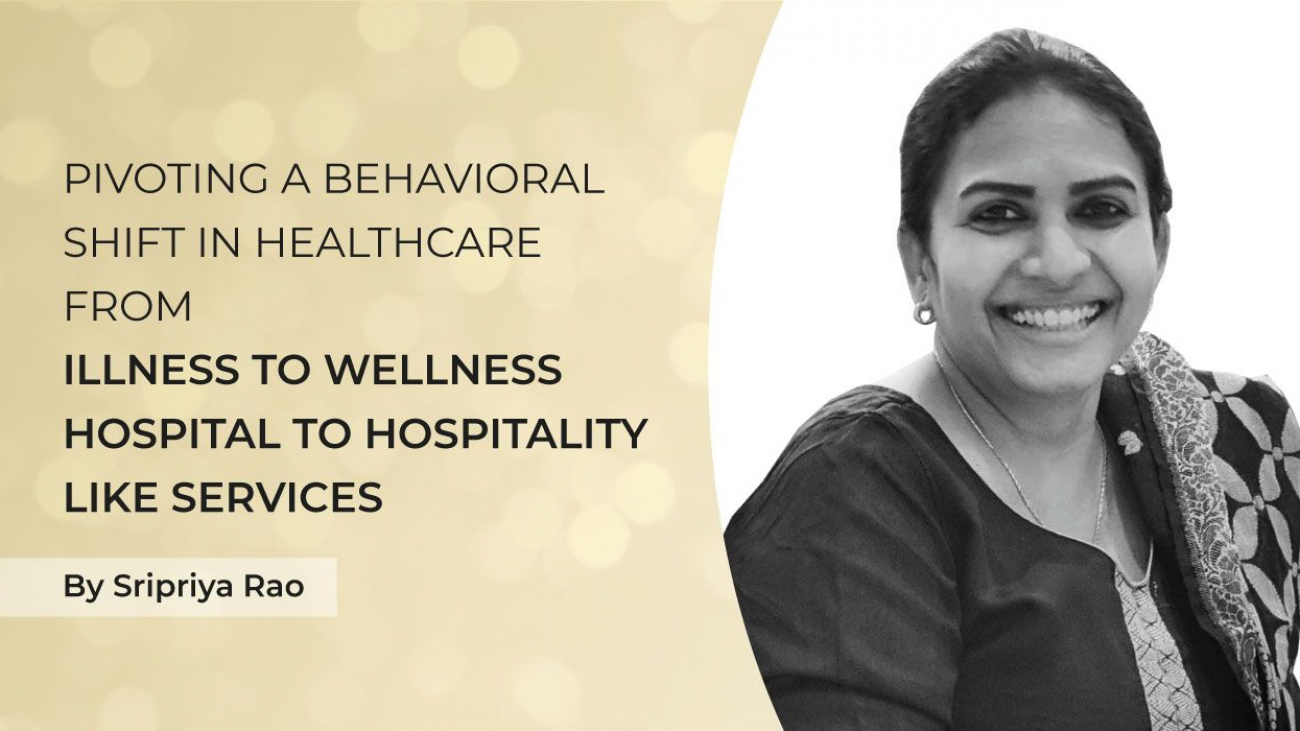Bringing to life an inclusive citizen-centric, holistic onco-tech platform
By Sripriya Rao, co-Founder and COO, Karkinos Healthcare
In the last few years, we have witnessed technology’s ability to revolutionize the world drastically. Using technology, industries have transformed from providing standalone services or products to holistic and integrated consumer-oriented services. No matter the industry, digital transformation is now a reality that scores tremendous beneficial applications.
Over the last two decades, I had the privilege to be part of business culture transformations, innovation, and technology shifts as a provider and consumer, to build connected ecosystems.
Although the healthcare industry has been evolving, albeit slowly, this trend is changing with more emphasis on the triad ― citizen experience, service ubiquity, and improved outcomes.
Although the healthcare industry has been evolving, albeit slowly, this trend is changing with more emphasis on the triad ― citizen experience, service ubiquity, and improved outcomes.
Digitization in healthcare and its manyfold benefits to cancer care
Digital technology by default is the need for current healthcare practices in India. It fosters creativity that is blended with pragmatism to introduce new citizen-centric services. The role of telecom has played a greater role in the changing healthcare paradigms by democratizing technology, introducing concepts such as cashless transactions, micro insurances, mobile-based point of care devices, teleconsultation, and more.
The healthcare industry is experiencing an infusion of digital practices across several segments in public and private hospitals and clinics. There are now tremendous opportunities to institutionalize these digital practices.
Tele-health, m-health, digital imaging, and pathology have all emerged to be successful solutions in taking healthcare to not only urban areas but also to the remote corners of India. We are witnessing the development of a more resilient healthcare system across the world including India that supports clinicians and nurses to deliver frontline high quality and safe care. The same resilience is seen evolving in cancer care too.
In recent years, mobile-based point of care devices have provided a significant change in rural health programs across India to detect and screen non-communicable diseases. The sensitivity and specificity of such devices are being improved each year, helping clinicians provide services to a larger gamut of people.
Treating cancer – a disease that causes severe financial stress on the patient – has now evolved along with this technological progress and can now be more data-backed, personalized, and informed. The siloed medical information of the patient can now possibly be combined on a single cloud platform making it readily available for the practitioner.
Cloud technology has made interoperability of health information a possibility today. Interoperability allows seamless health information exchange across the entire ecosystem paving way to numerous possibilities in increasing the quality of care delivered, and in scaling patient experiences. When the patient takes center stage, medical centers’ digital infrastructure becomes more interoperable, ultimately enabling better cancer treatment outcomes too.
Cloud technology has made interoperability of health information a possibility today. Interoperability allows seamless health information exchange across the entire ecosystem.
Determined to deliver a phygital onco-tech platform
At Karkinos, we have embarked upon a revolutionary journey in establishing quality, affordable, and accessible cancer care by harnessing digital technology.
Our cancer care platform is built for the future with focus on early cancer detection. Challenging the traditional healthcare rulebook, our platform approach will enable the connected ecosystem to deliver care in a participatory model, to democratize access and to improve citizen engagement.
Our core medical team’s knowledge in cancer is gold standard and their intellectual capital forms our major asset. Our talent pool that consists of an eminent panel of clinical advisors, oncologists, nurses combined with an adept team of healthcare technologists and digital enthusiasts are focusing on redefining cancer care by making it more diverse, accessible, and affordable to the patients.

We are also working on the missing DNA in cancer care by bringing personalized patient care with our KareMitras, who empathetically embrace the patient and guide them through our proprietary patient navigation system. A citizen/patient should never feel lost or perplexed or even left anxious about the modalities or pathways in cancer care. Hence, the deputed KareMitras, who are the ground personnel tending to individual patient needs, direct the citizen or patient in the most informed and supportive manner to navigate the patient at every touch point through a seamless channel of care pathway.
Transforming healthcare: Infusing behavioral shift
It is a known fact that cancers detected at an early stage are cured better. We have pledged to partner with as many tertiary hospitals as possible to screen for the most common cancers among the Indian population. By doing this, we will fulfil Karkinos’ vision to offer cancer screening at a community level in every block of the country. The screening programs are designed to address not only early cancer detection but to also identify the contributing risk factors that can predispose an individual to cancer.
The projected incidence of patients with cancer in India among males was 679,421 (94.1 per 100,000) and among females 712,758 (103.6 per 100,000) for the year 2020. The report finds that 1 in 68 males (lung cancer), 1 in 29 females (breast cancer), and 1 in 9 Indians will develop cancer during their lifetime (0-74 years of age) *. The projected 5 most common cancers in 2020 for males (lung, mouth, prostate, tongue, and stomach) constitute 36% of all cancers and for females (breast, cervix uteri, ovary, corpus uteri, and lung) constitute 53% of all cancers*. These numbers are alarming.
Cancer researchers emphasize on the fact that about 70% of cancers in India are potentially preventable through modifiable risk factors and the only other resolution to bring down this high incidence rate is through ‘early cancer detection’. India is already playing catchup with focus mostly on late-stage treatment of cancer incidents. To address this, Karkinos Healthcare has laid down its primary goal to shift the focus towards the left side of the spectrum, i.e., to ‘Early detection‘.
Our community cancer screening programs intend to mass educate and empower patients with the knowledge on the causes of cancer and the need to maintain a healthy diet and lifestyle for good wellbeing. Eventually, these programs would have infused a behavioral shift and an attitude from illness to wellness, which should ultimately reflect a significant decrease in the cancer incidence among the Indian population.
Karkinos Healthcare has laid down its primary goal to shift the focus towards the left side of the spectrum to ‘Early detection’.
All our constructs in cancer care are integrated in a hub-and-spoke and a further spoke model. This will ensure that the patient at no point is disconnected from care services and a care continuum is maintained right from screening, prevention, to palliative care.
Our Chemotherapy Daycare Centers are extensively located and are well-managed by the leading oncologists and trained onco-nurses. These centers are digitally supported, full-fledged cancer clinics that are designed to offer holistic oncology services bearing patient empathy and most importantly cost-effectiveness in mind.
The new-age services such as ambulatory care nursing, tele-health, IoT devices are embedded into our robust delivery framework. We are building a data-rich knowledge base that can be curated to lead the company’s research team to design more personalized cancer treatment and support clinical research, innovation, and development of cancer therapies.
As a co-Founder and COO, I am determined that Karkinos Healthcare should bring the company’s ‘curated cancer care platform to life’ and most importantly establish a collaborative and participatory model with integrated care as the main principles of operation. All those challenges in the existing DNA of healthcare will be shifted to a model that services digital, remote, cashless, presence less, and paperless to transform the feel from ‘Hospital to Hospitality’ model of operations and rivet the behavioral shift from ‘Illness to Wellness’.
As a co-Founder and COO, I am determined that Karkinos Healthcare should bring the company’s ‘curated cancer care platform to life’.
Onus on women wellness
Cervical cancer, being the second most common form of cancer in Indian women, is the only cancer for which the causative reasons are known and is the only cancer that has preventive solutions in the form of a vaccine. But it is heart wrenching to note that India has a long way to go in elimination and is yet to catch-up with several countries like Australia, Finland that are already in the path of eliminating cancer by 2028/2030. To fast track the elimination, the World Health Organization’s (WHO) global mandate stresses on extensive screening of women for early detection and creating awareness on the causes of cervical cancer.

Beginning this year, I have kick-started a “Well Woman” initiative with an aim to screen 100,000 women for Karkinos Healthcare’s comprehensive cervical cancer care management using RT-PCR based testing for Human papilloma virus (HPV). The initiative meets WHO’s 90-70-90 model for eliminating cervical cancer by 2030, by providing state-of-the-art, accurate, screening for HPV, and comprehensive Cervical Cancer Management.
